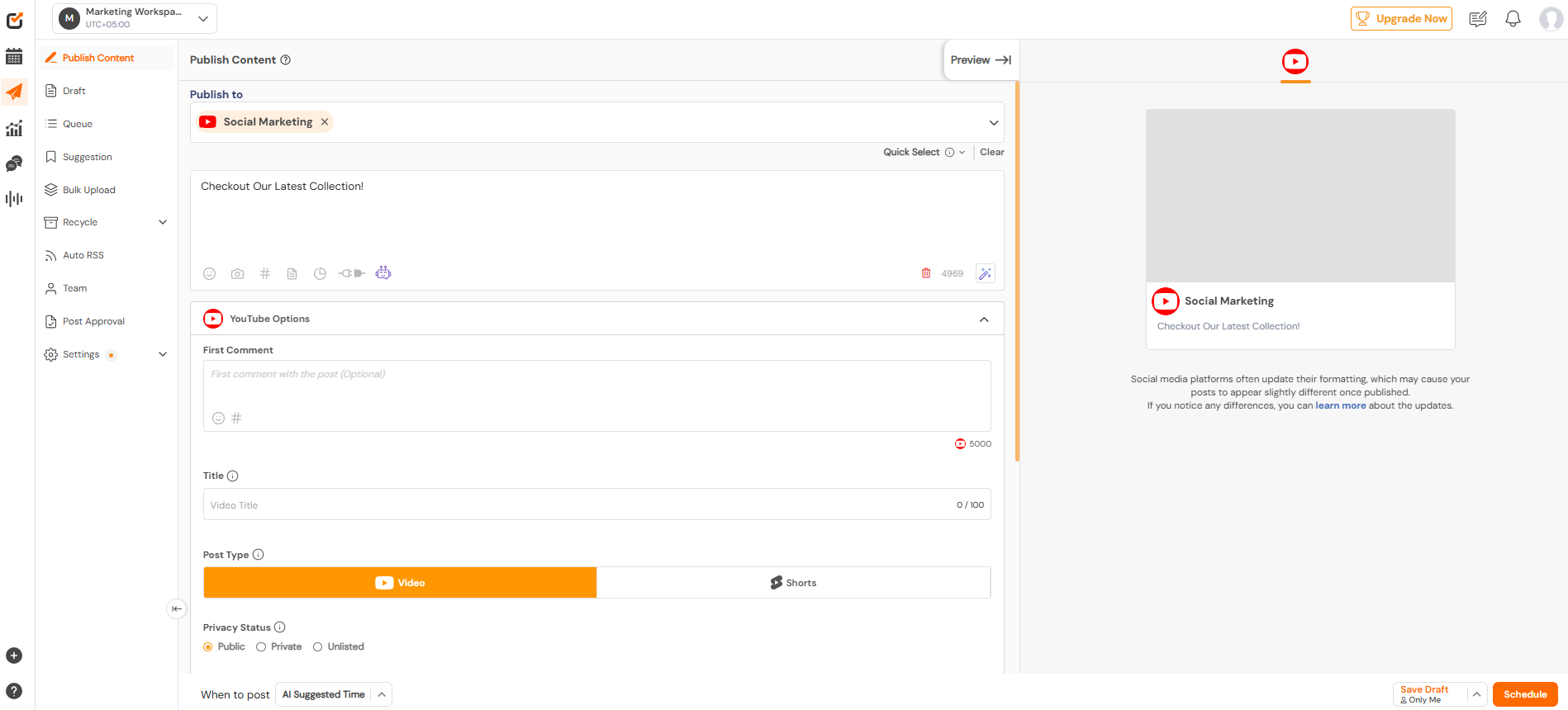When it comes to social media marketing, myths often spread faster than facts.
For example, some marketers claim they post content daily to drive success, while some say posting daily diminishes quality.
These misconceptions can be confusing.
They drain your time, resources, and ROI if left unchecked.
Truth be told, effective social media management isn’t about blindly following trends or outdated advice—it’s about leveraging the right tools and insights.
That’s where social media management tools like Social Champ come in.
As an all-in-one social media management platform, Social Champ helps you cut through the noise, debunk the myths, and implement data-driven strategies that work.

Tired of Falling for Social Media Myths? Take Control With Social Champ!
From planning your content to creating and ultimately publishing it, Social Champ offers countless tools that make your SMM 10X more effective!
Short Summary
- Many social media myths can mislead marketers and waste valuable resources.
- The belief that more followers directly equals success is inaccurate; engagement is more critical.
- Organic reach is not dead but requires strategic planning and high-quality content to be effective.
- Posting frequently doesn’t guarantee better results; understanding your audience and posting at optimal times is key.
- Social media success doesn’t solely depend on paid ads; organic efforts can be just as impactful when done correctly.
- Social media platforms are constantly changing, so staying updated and adaptable is crucial for long-term success.
Top Social Media Myths You Should Ignore
Social media marketing is filled with myths that can lead businesses to make decisions based on inaccurate assumptions.
These social media myths often misguide marketers, wasting time and resources.
Let’s dive into some of the most common myths about social media and why they don’t hold up in today’s digital landscape.
-
You Need to Be On Every Platform
A common myth is that businesses must be on every social media platform to succeed.
While having a presence everywhere might seem like a good idea, it’s not always necessary.
Instead, focusing on the platforms where your target audience is most active is more important.
For example, LinkedIn might be ideal for B2B marketing, while Instagram or TikTok could be more suitable for consumer-facing brands.
Spreading yourself too thin can dilute your efforts and hinder your ability to engage with your audience effectively.
-
More Followers Equals More Success
It’s easy to fall into the trap of thinking that the more followers you have, the more successful your social media strategy is.
However, the quality of your followers matters far more than the quantity.
Myths about social media often fail to recognize that engagement—likes, comments, shares, and conversions—is what truly measures success.
Building a loyal, engaged community of followers is much more valuable than simply chasing high numbers.
Focus on nurturing relationships with your audience rather than obsessing over follower counts.
-
You Have to Post Every Day
Posting every day is not always the best strategy.
While consistency is necessary, the key is quality, not quantity.
Social media myths suggest frequent posting is necessary, but bombarding your audience with content may lead to fatigue or even unfollows.
Instead, prioritize creating valuable, relevant content that resonates with your audience.
Posting less frequently but with higher value can lead to better engagement and brand loyalty.
Social Champ allows you to schedule and automate posts without worrying about consistency, ensuring that each post is crafted for maximum engagement.
Their smart scheduling system ensures posts go out at the most optimal times based on your audience’s activity.
This way, you can focus on creating quality content rather than stressing about posting daily.

Social Champ’s Dashboard -
Social Media Is Free Marketing
Many businesses still believe that social media is a free marketing tool, but this is far from the truth.
While creating an account and posting content may be free, achieving significant reach and engagement requires investment.
Whether it’s through paid advertising, premium tools, or time spent creating quality content, there are costs associated with using social media effectively.
Understanding this can help businesses set realistic expectations and allocate resources accordingly.
-
Hashtags Are the Key to Success
Hashtags have long been considered a quick way to boost reach and visibility on social media, but they’re not a magical solution.
Myths about social media often overemphasize their importance.
While using relevant hashtags can help categorize your content and make it discoverable, relying on them alone won’t drive success.
The key to success lies in creating high-quality content and engaging with your audience.
Hashtags can support your efforts, but should never be the sole focus of your strategy.
-
Negative Comments Will Ruin Your Brand
It’s natural to fear negative comments on social media, but they won’t necessarily ruin your brand.
In fact, handling criticism effectively can enhance your reputation.
Social media myths often suggest avoiding or deleting negative comments, but addressing concerns thoughtfully and professionally can build trust with your audience.
Transparency and responsiveness are critical.
Brands that show they care about feedback and are willing to improve tend to gain respect from their followers.
-
AI Will Replace Human Creativity
Artificial intelligence (AI) has made significant strides in social media marketing, but it won’t replace human creativity.
AI can certainly help with tasks like content scheduling, data analysis, and even writing captions, but it lacks the emotional intelligence and creative insights humans bring.
The myth that AI will ultimately replace human creativity is simply false.
Instead, AI can serve as a tool that enhances creativity and streamlines processes, allowing marketers to focus on high-level strategy and innovation.
Featured Article: Understanding Social Media Performance: Metrics That Matter
How to Spot and Avoid Social Media Myths
In the world of social media marketing, separating fact from fiction is crucial.
With so many opinions, strategies, and trends circulating online, it can be easy to fall for common social media myths that may steer you off course.
By learning how to spot these myths and understanding their origins, you can make better, data-driven decisions for your brand.
Here’s a guide on how to recognize and avoid myths about social media, ensuring your strategies remain effective and relevant.
-
Look for Evidence and Data
The first step in spotting social media myths is to question claims that lack concrete evidence or data.
A lot of myths are based on personal experiences, anecdotal evidence, or outdated information, which can quickly lead to misguided decisions.
For example, “posting more equals more engagement” is a popular myth, but research consistently shows that high-quality content posted less frequently often outperforms more frequent, lower-quality posts.
Before adopting any strategy, check for credible research or case studies supporting the claims.
-
Avoid One-Size-Fits-All Advice
Another common myth about social media is that there is a universal formula that works for all businesses.
Social media marketing is not a “one-size-fits-all” practice.
What works for one brand or industry may not work for yours.
For example, posting frequency, platform preferences, or engagement tactics vary greatly depending on your target audience, business goals, and industry.
Be wary of generic advice and instead tailor your approach to your brand’s specific needs.
Customize your strategies based on what resonates with your unique audience.
-
Understand the Algorithm
Social media algorithms continually evolve, and many myths arise from misunderstandings of how these algorithms work.
For example, some believe using certain keywords or hashtags will automatically boost your reach, but the reality is much more complex.
Algorithms prioritize engagement and relevance, meaning your content must truly resonate with your audience to gain visibility.
Invest time in understanding the platform’s algorithm and its impact on content distribution to avoid falling for myths.
Keep up with official updates and trusted industry sources to stay informed.
With Social Champ, you can track the performance of your posts, optimize your strategy based on audience insights, and ensure that your content reaches the right people at the right time.
Their built-in analytics tools provide data-driven insights to help you fine-tune your approach and beat algorithm myths.

Social Champ’s Analytics

Think Social Media Myths Are Holding You Back? Try Social Champ
Debunk the myth that old posts lose their charm. Social Champ makes recycling your best content a breeze, maximizing ROI.
-
Don’t Overvalue Followers
A common social media myth is that the more followers you have, the more successful your brand is.
This myth overlooks the importance of engagement, which is often a more reliable indicator of success.
It’s crucial to build relationships with followers who engage with your content rather than simply trying to grow your numbers.
Focus on producing relevant content, responding to comments, and interacting with your community to foster meaningful engagement.
Be mindful of vanity metrics like follower count and prioritize metrics that reflect your actual audience interaction.
-
Follow Trusted Experts
The spread of myths about social media often comes from individuals or influencers with limited knowledge of the field or those who may be promoting their own services.
To avoid falling for myths, seek out reputable sources, including industry experts, established marketing agencies, and official platform guidelines.
Social media marketing trends and best practices are continually evolving, so it’s essential to follow credible voices who stay current with industry changes.
This helps you make informed decisions and avoid strategies based on misconceptions.
-
Challenge the Status Quo
Many social media myths are rooted in conventional wisdom, such as the idea that social media is only for younger audiences, or that video content is always more successful than images.
It’s important to challenge these assumptions and test them for your brand.
The truth is that social media is a diverse space where various content types, strategies, and audience demographics exist.
Instead of following outdated practices, try experimenting with different approaches and measuring their success.
Conducting A/B tests, monitoring analytics, and iterating on your approach can help you separate fact from fiction.
-
Be Critical of Quick Fixes
Social media marketing is a long-term game, and any myths about social media that promise quick fixes should be approached with skepticism.
For example, there are myths that say using trending hashtags or viral challenges will bring instant success.
While these tactics may work temporarily, they are rarely sustainable without a solid, long-term strategy.
Avoid shortcuts and focus on creating a comprehensive social media plan that includes content calendars, audience analysis, and consistent engagement efforts.
Building an authentic, engaged community takes time but yields more lasting results.
-
Keep Learning and Stay Updated
One of the most effective ways to avoid social media myths is by continually learning and staying up-to-date with the latest trends and best practices.
The social media landscape changes rapidly, and strategies that worked a few months ago may not be effective today.
Subscribe to reputable marketing blogs, attend webinars, participate in industry forums, and follow experts who are constantly adapting to new changes.
The more informed you are, the better you can navigate through the noise and avoid the pitfalls of outdated or misleading myths.
Featured Article: TikTok Live Studio: Everything You Need to Know in 2025
Conclusion
In conclusion, understanding the truth behind social media myths is essential for creating effective marketing strategies.
Marketers can make more informed decisions by debunking common misconceptions, such as the need to be on every platform or the belief that more followers automatically lead to success.
It’s important to focus on quality content, meaningful engagement, and data-driven strategies rather than relying on outdated myths.
As the digital landscape continues to evolve, staying adaptable and separating fact from fiction will empower businesses to maximize their social media potential and achieve long-term success.







